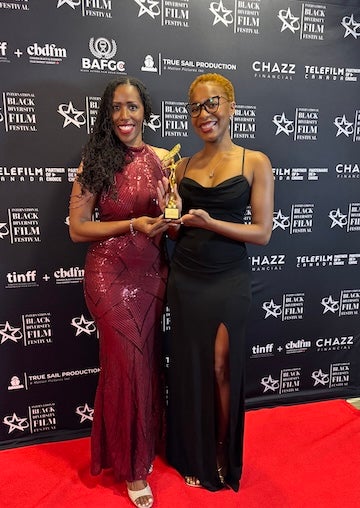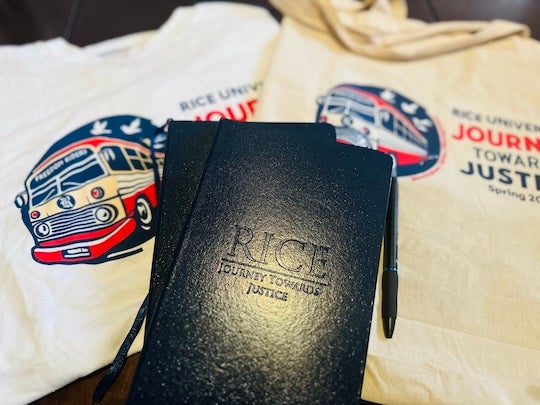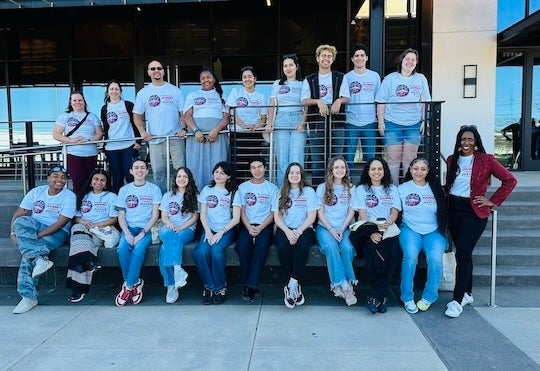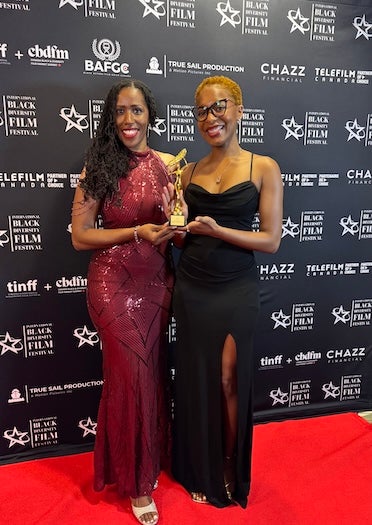Before Journey Towards Justice became an immersive Rice University course that brings students face to face with civil rights history, it was an idea — sparked by a question Elizabeth Hordge-Freeman asked herself while launching a racial justice initiative in Florida: What would it look like to teach history and sociology not just through books but through place?
That idea became a course. The course became a journey. And the journey became a documentary.

Now that documentary, co-directed and executive produced by Hordge-Freeman alongside Ta’Bria Snowden, Kathleen Heide and Nicole Luckett, is gaining international recognition. Filmed during the first iteration of the course in 2024, “Journey Towards Justice” was recently awarded Best Advocacy Film at the International Black and Diversity Film Festival in Toronto, its second major award following a win at Florida’s Juneteenth Film Festival last year. It has now been screened at several festivals and will have its first public university screening later this year. But for Hordge-Freeman, the recognition is less about accolades and more about the platform it provides.
“It was never just about a film,” said Hordge-Freeman, associate professor of sociology. “It started as a way to document the class, but it became something bigger — a reflection of how deeply this experience impacted the students.”
Hordge-Freeman first co-developed the course in 2024 as founding chair of the Racial Justice Initiative at the University of South Florida. The program was made possible by a transformative gift from philanthropist and Rice alumna Carolyn Midkiff Strange ’60, who believed deeply in the power of racial justice education. At the time, Hordge-Freeman wasn’t yet at Rice, but Strange’s gift laid the foundation for the Journey Towards Justice course and its first student trip through Alabama.
“It was incredibly meaningful to know that Carolyn believed in this work before it had even fully taken shape,” Hordge-Freeman said. “That support allowed us to build something lasting, and the fact that she’s a Rice graduate makes it feel all the more full circle.”
As the course took shape, it became clear the experience was worth documenting — not just for internal reflection but to help others understand the lasting impact this type of education could have.
The resulting documentary follows students as they move from classroom learning to standing on the literal ground where civil rights history was made. Along the way, they reflect on what it means to encounter truth in spaces where violence, resistance and resilience once unfolded.
“This kind of experiential learning transforms how students understand history and themselves,” Hordge-Freeman said. “It’s not just about information. It’s about empathy and engagement.”

She brought that same vision to Rice in spring 2025, launching a new version of Journey Towards Justice as an immersive sociology course supported by the Department of Sociology, the Center for African and African American Studies (CAAAS) and the School of Social Sciences’ Moody Gateway Program with additional philanthropic support from Walt Greenberg ’78. Through Faculty-Led Immersion Programs, the initiative provided students the opportunity to travel to Alabama at no cost. The Center for Civic Leadership and the Center for Engaged Research and Collaborative Learning also expanded access to more students and made it possible for outside faculty, such as Byron Parker from Texas Southern University, to join the trip.
Abbey Godley, assistant dean for student programs, coordinated essential logistics for the class, allowing faculty to focus on teaching while students immersed themselves in every step of the experience.
“Coming to Rice, I hoped there would be support for this work, and I’ve been met with nothing but encouragement,” Hordge-Freeman said. “The dean has already committed to doubling the number of students for next year.”
Rachel Tolbert Kimbro, dean of the School of Social Sciences, said the documentary exemplifies the kind of impact that research and community engagement can achieve.
“The work Elizabeth and her team have done on ‘Journey Towards Justice’ is a model example of putting research into action through advocacy efforts,” Kimbro said. “The film poignantly captures the importance of enhancing our understanding of the civil rights era as it relates to current events and race-related issues in the U.S. We are so proud of Elizabeth for this recognition and will continue to support this project as it evolves and makes more meaningful change in our communities.”
While the awards have helped amplify the message, Hordge-Freeman said the most meaningful impact has come from seeing how the film reaches audiences who might never engage with traditional academic work.

“For several years, I have participated in a museum studies program funded by a U.S. Department of Education REACH grant and led by Dr. Davis-Cotton during which I have developed a much deeper appreciation for the power of art and storytelling to inspire students. This kind of storytelling meets people where they are,” she said. “It connects across generations, across borders, across disciplines. It reminds us that justice isn’t just something to study — it’s something to live.”
The documentary will have its first public university screening this fall at Rice in partnership with Rice Cinema and CAAAS.

